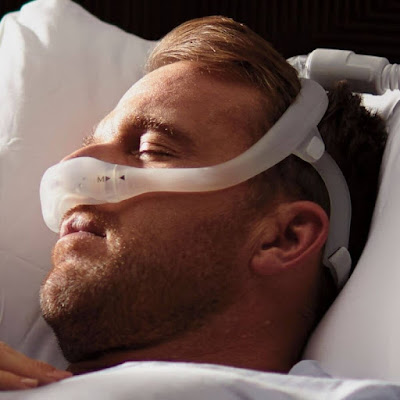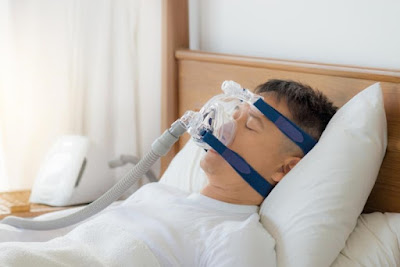 |
| source: comprehensivesleepcare.com |
Do you experience breathing problems during the night? Have you recently discovered you suffer from sleep apnea? Sleep disorders are a serious problem for an increasing number of people. Not getting uninterrupted sleep means our bodies cannot recuperate during the night so we can function properly the next day. This is why the implementation of CPAP machines in your night routine can play a vital role. The question now is, what’s the most suitable type for your specific needs? We’ll explore the distinctions between nasal CPAP machines and full-face CPAP masks, and discuss the benefits of using these devices.
What Is a Nasal CPAP Machine?
Obstructive sleep apnea (OSA) is a condition characterized by periodic interruptions of breathing due to the collapse of the airway during sleep. A nasal CPAP machine is a type of therapy device used primarily for the treatment of this sleeping disorder. These devices work by delivering a continuous stream of pressurized air (Continuous Positive Airway Pressure) into the airways, ensuring they remain open throughout the night, thus promoting uninterrupted breathing.
Differences Between Nasal and Full-Face Masks
Nasal CPAP Machine
 |
| source: healthline.com |
This type of CPAP machine uses a mask that covers only the nose. The masks can vary from smaller nasal pillows that fit at the nostril openings to larger nasal masks that cover the entire nose. They are generally considered more comfortable due to their smaller size and less intrusive fit. The nasal CPAP machine is comfortable and less likely to cause feelings of claustrophobia and allow for easier movement during sleep. They are easier to adjust and less likely to displace during sleep compared to full-face masks. These masks are simpler to put on and take off and are less cumbersome when adding or removing glasses. Nasal CPAP Machines are best suited for those who breathe naturally through their nose.
Full-Face Mask
 |
| source: healthline.com |
A full-face mask covers both the nose and mouth. This type of mask is typically used by individuals who breathe through their mouths during sleep or who find nasal masks uncomfortable or ineffective. They can feel bulky and more restrictive because they cover a larger portion of the face. They can also lead to increased incidences of air leaks and discomfort but are essential for mouth breathers. Full-face masks might require more frequent adjustments due to their larger size and the greater surface area against the face. These types of masks are necessary for patients who breathe through their mouths during sleep or who have nasal congestion issues that cannot be otherwise managed.
Who Can Use Nasal CPAP Machines?
Nasal CPAP is ideal for individuals who:
• Are diagnosed with mild to moderate obstructive sleep apnea.
• Prefer less facial coverage to avoid feelings of claustrophobia.
• Are primarily nose breathers (do not breathe through the mouth during sleep).
• Do not frequently suffer from nasal congestions or allergies affecting nasal passages.
• Find full-face masks uncomfortable or cumbersome.
It is important for users to have a discussion with their healthcare provider or a sleep specialist to ensure that a nasal CPAP machine is appropriate based on their specific symptoms and sleep habits.
Benefits of Nasal CPAP
• Increased Comfort: Due to their smaller size and reduced facial coverage, many users find nasal masks more comfortable to wear, especially those who may feel confined by larger masks.
• Fewer Interruptions: With less equipment on the face, there is less likelihood of the mask being dislodged during sleep, which can lead to more consistent usage and better overall treatment adherence.
• Ease of Mobility: For active sleepers, a nasal mask offers more freedom to move around, which can result in better sleep quality without compromising the effectiveness of the therapy.
• Reduced Air Leakage: Smaller masks tend to fit more snugly, thereby minimizing the potential for air leaks. This can improve the efficacy of CPAP therapy as the prescribed air pressure levels are maintained more consistently.
• Clearer Field of Vision: Without the presence of a mask covering the bridge of the nose or extending down to the mouth, users can easily engage in activities like reading or watching TV before sleep, which can make the bedtime routine more pleasant and relaxing.
• Less Intrusive: CPAP nasal masks are generally less intimidating for new users of CPAP therapy, potentially reducing the psychological barrier to regular use associated with bulkier full-face masks.
Takeaway
Choosing between a nasal CPAP machine and a full-face mask largely depends on the individual’s specific needs, comfort preferences, and breathing habits. Nasal CPAP machines offer a viable and often preferred option for those who can breathe comfortably through their noses throughout the night. They are praised for their comfort, minimalistic design, and ease of use, which can significantly enhance adherence to CPAP therapy.
Patients should closely collaborate with their healthcare providers to select the most appropriate CPAP equipment. Adequate education on the proper use and maintenance of the device, along with regular follow-ups, are crucial steps in managing obstructive sleep apnea effectively and enjoying a restorative night's sleep.
No comments:
Post a Comment